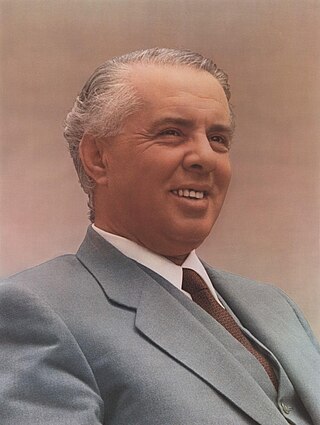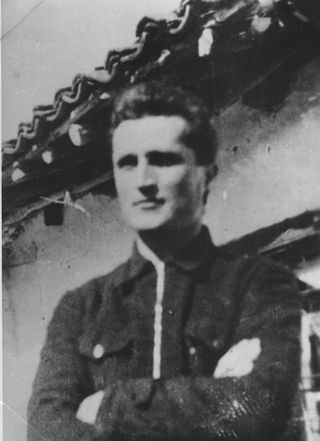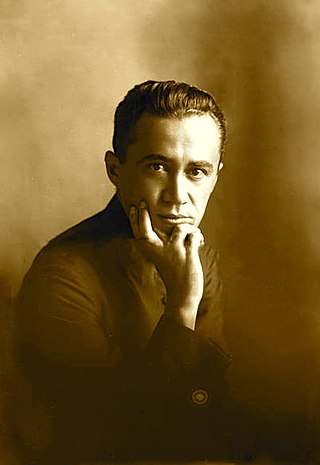
Enver Halil Hoxha was an Albanian communist revolutionary and politician who was the leader of Albania from 1944 until his death in 1985. He was the First Secretary of the Party of Labour of Albania from 1941 until his death, a member of its Politburo, chairman of the Democratic Front of Albania, and commander-in-chief of the Albanian People's Army. He was the twenty-second prime minister of Albania from 1944 to 1954 and at various times was both foreign minister and defence minister of the country.

In Albania, World War II began with its invasion by Italy in April 1939. Fascist Italy set up Albania as its protectorate or puppet state. The resistance was largely carried out by Communist groups against the Italian and then German occupation in Albania. At first independent, the Communist groups united in the beginning of 1942, which ultimately led to the successful liberation of the country in 1944.

The Labour Youth Union of Albania was the youth organization of the Party of Labour of Albania. Founded on November 23, 1941 as the Communist Youth it was officially described as the "greatest revolutionary force of inexhaustible strength" and a "strong fighting reserve of the party" it was a key organization for political socialization in socialist Albania. It was affiliated with the Democratic Front.

Mid'hat Bey Frashëri was an Albanian diplomat, writer and politician. The son of Abdyl Frashëri, one of the most important activists of the Albanian National Awakening in 1908 he participated in the Congress of Monastir. In 1942 he became the president of Balli Kombëtar, an Albanian fascist collaborationist and anti-communist movement during the Second World War. Frashëri is referred to as one of the fathers of modern Albanian nationalism.
The Rudaj Organization was an Albanian mafia gang in the New York City metro area, named for the man accused of being its kingpin, Alex Rudaj of Yorktown, New York. The Rudaj Organization, called "The Corporation" by its members, was started in 1990s in The Bronx and spread to Westchester county and Queens. Prosecutors say the Albanian gang was headed by Alex Rudaj and an Albanian Italian man named Nardino Colotti who both had ties to the late Gambino soldier Phil "Skinny" Loscalzo.

Omer Nishani was an Albanian medical doctor and political figure involved first in the struggle against Ahmet Zogu in the 1920s and 1930s, and then in the struggle against the fascist occupation of Albania during the 1942–44 period, becoming Chairman of the Presidium of the People's Assembly of the People's Republic of Albania in 1946 and serving in this position until 1953.

Debatik Nazmi Curri is an Albanian professional football coach and former player.

Fadil Hoxha was a Yugoslavian ethnic-Albanian communist revolutionary and politician from Kosovo. He was a member of the Communist Party and fought in the Yugoslav Partisans during World War II. After the war, he was the first President of the Executive Council of the Autonomous Region of Kosovo and Metohija (1945–1963) and later member of the Presidency of Yugoslavia (1974–1984).

The Albanian Kingdom was the official name of Albania between 1928 and 1939. Albania was declared a monarchy by the Constituent Assembly, and President Ahmet Bej Zogu was declared King Zog I. The kingdom was supported by the fascist regime in Italy, and the two countries maintained close relations until Italy's sudden invasion of the country in 1939. Zog fled into exile and never saw his country again. The Communist Party of Labor of Albania gained control of the country toward the end of World War II, established a communist government, and formally deposed Zog.

Eqrem Bey Vlora was an Albanian lord, politician, writer, and one of the delegates to the Assembly of Vlorë, which proclaimed the Albanian Declaration of Independence on November 28, 1912. He is described as The Last of Beys, the embodiment of the Albanian aristocracy of the time, although he came from a caste founded on the principles of Ottoman military fief.

Llazar (Zai) Fundo was an Albanian Communist, later social-democratic journalist and writer. He was a former member of the Comintern and the Balkan Communist Federation. He was associated with the Fan S. Noli government in 1924 and became the leader of the Bashkimi organization after the death of Avni Rustemi in 1924. In 1928 he helped establish the Korçë Communist Group. In the fierce rivalry for power control within the Communist Party, he was branded a Trotskyist and purged from the party.

Albanian Lictor Youth was a youth organization which served as the youth wing of the Albanian Fascist Party. The Albanian Lictor Youth was one of the associated organizations of the Albanian Fascist Party, as stipulated in its statute, which was formulated in a decree of the Italian vicegerent issued on 2 June 1939.

Misto Mame is an Albanian World War II People's Hero. He was killed in action against Fascist Italian forces on 16 August 1942.
The Albanian National Lyceum or French Lyceum was a high school in the city of Korçë, Albania, financed by the Albanian government, but that emphasized the French culture and the European values. The school fully functioned in the years 1917–1939. The building is still used to host the Raqi Qirinxhi High School.
Gëzim Erebara was an Albanian film director, screen player, translator and cinematography historian of the second half of the 20th century. He studied at the Prague Academy of Fine Arts in 1947–51 but was repatriated few months before graduation for political reasons by the then Communist Government of Albania. He worked in the state owned "Kinostudioja Shqiperia e Re" from 1957 to 1986 and authored or co-authored some of the most important movies.
Qazim Mulleti (1893–1956) was an Albanian politician, nationalist and mayor of Tirana from 1939 through 1940 and its prefect from 1942 to 1944.

The Pioneers of Enver was a pioneer movement functioning in Albania during its communist period. Formed as Debatik, an acronym for United Boys of Communist Ideas on 10 February 1942, the movement continued as Organization of Pioneers. After the Second World War, it was supervised by the Labour Youth Union of Albania, the youth wing of the Party of Labour of Albania.

Ramiz Sadiku was an Albanian law student and one of the organizers of the anti-fascist uprising in Kosovo.

Lazër Shantoja was an Albanian blessed, publicist, poet, satirist, and translator into Albanian from Goethe, Schiller and Leopardi, as well as his country's first Esperantist. He was one of the first Catholic priests, arrested by the communist government, and the first Albanian priest that was shot by a firing squad. He was accepted by the Catholic Church as a martyr in 2016, part of the Martyrs of Albania.

DebatikCenter of Contemporary Art is a contemporary art center and independent film production center based in Tirana, Albania. D.C.C.A defines itself as "nexus of academics, activists, architects, artists, imaginary and real collectives, critics, curators, journalists, translators, etc., that seek to shine a light on these practices but also offer the necessary tools to imagine alternative futures and strategies of resistance to the status quo."















